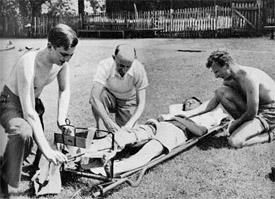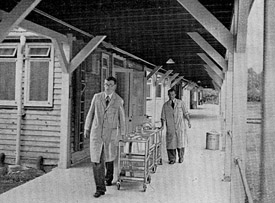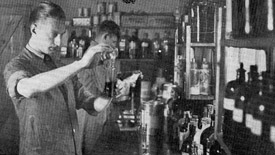

FAU China Convoy Reunion Group
Selection and Training
Applicants wishing to join the Unit were interviewed by Paul Cadbury and others at locations up and down the country. It does not seem there were any formal selection criteria but rather that selection was left to the veteransí judgement of an individualís character and commitment.
A training camp was established at Manor Farm, Northfield, near Birmingham, provided by Elizabeth Cadbury. Initially, as demand exceeded the campís capacity, priority to attend the camps was given to Members of the Society or those who had attended Quaker schools and to applicants aged between twenty and thirty.
The first group of 60 trainees arrived at Manor Farm in September 1939; 21 other camps were to follow including supplementary facilities at Buckhurst Hill Youth Hostel and three for women at Barmoor, Yorkshire. Basic training was provided in first aid and physical fitness and also in the rudiments of marching and military drill. The idea was that if the Unit was to work alongside the military, in the thick of it where suffering and the need for aid was most acute, they had to be able to fit in and look the part so they wore khaki and learned to march, albeit to the discomfort of some.
Final acceptance into the Unit was determined after the training camp. This seems to have been as much a test of compatibility as of competence and no-one was guaranteed a place.
As the camps began to turn out their newly prepared personnel eager to be put to use, it was determined that all members should undergo further training in medical work and in driving and motor mechanics. Other wartime demands were creating a shortage of manual labour which enabled agreement to be reached with the London and Borough Hospitals where opportunities were found for deployment as porters, cleaners and in other auxiliary roles.
Here they were initially greeted with some wariness and disapproval but steadily began to establish their credibility by being of use, and being willing to undertake any work to support those in need. This proved to be a valuable grounding for the Unitís members as they learnt the basics of hospital operations, of medical procedures, anaesthetics, x-rays, vaccination, hygiene and pharmacy.
Some members were deployed to hospitals across the Midlands, South East and South Coast. Their experience accelerated with the advent of the Blitz which saw the Unit not only engaged directly in dealing with casualties but with wider aspects of relief work and social work amidst the rubble.

First Aid Training

Orderly Duties

Learning Basic Pharmacy

 FAU China Convoy Reunion Group
FAU China Convoy Reunion Group 
 FAU China Convoy Reunion Group
FAU China Convoy Reunion Group 

